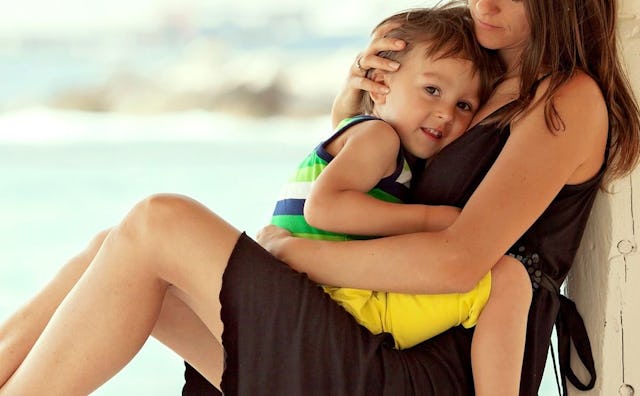Confessions Of An Anxious Mother: Learning To Let Go

Suddenly I was in a running washing machine, no sense of direction, saltwater scouring my sinuses. When I surfaced, I couldn’t find my son. It was only a few seconds more before his blue swim shirt breached the surface like a strange breed of dolphin, that his head popped up and he, too, tumbled toward shore, but the whole time my heart beat up against my throat as though he had been under for hours. When I finally grasped his little arm and pulled him toward me, I cried, “Are you okay? That must have been so scary.”
A smile broke across his face. “That was awesome!”
A little shaken, I tried to hold him through the next wave, but he pushed me away with an expression of outrage. “Don’t hold me, Mom!” And any other time I went after him in fear, he called out “I’m fine” with an adult level of exasperation and dashed away toward his father. I quickly realized that he liked letting these little waves tumble him under—that the brief few seconds when you’re not sure of your next breath isn’t terrifying, but instead exciting. To him, at least.
Later on that evening, my husband pulled out the video he’d taken of us playing in the water, and I observed with some embarrassment the way my arms clutched Ben through a perfectly acceptable wave, my cheeks clenched in anxiety.
I wished in that moment that this was but a rare display of hovering mother anxiety, but suddenly a movie montage of instances when I’d felt this irrational fear swept over me: when my son plays on the front lawn, which borders the street; when he climbs to the top of his tree house, which has no walls, only ropes; when he takes the street too fast on his scooter; at the too-close edges of things like cliffs and seawalls, which he has always loved to press; and at many other times.
How did I become this anxious mom? I, who was raised with little supervision, a latchkey kid who walked a mile home from school alone, who took public transportation in middle school, who traveled through Europe by train alone in my 20s. How did I become afraid of letting my son play in the waves or climb too high or run too fast?
It’s in stark contrast to my husband’s method of parenting. His own slightly edge-pushing tendency has translated to a child who tests his own limits with the knowledge that he will be okay. My husband is the one who taught him to swim to the bottom of the pool by piggybacking him down and back up again, while I stood by biting my lip and suppressing images of doing CPR on my blue child. My husband is the one who says “Do it” when I say “I’m not so sure.”
I often think of my own grandmother, whose only son at the time—my uncle—was hit by flying shrapnel in the 1947 skirmish to establish the state of Israel (at the time it was still Palestine). Though he wasn’t seriously injured, the event traumatized my Oma enough that she begged my Opa for a second child. A “back-up” child, I’ve since come to think of my father. The child who would still be there in the worst-case scenario that something happened to her first born.
I’m not quite so morbid, nor living in such trying times, but I don’t kid myself: Being the mother of only one child leaves me with an existential terror of how I would go on living if the worst came to pass. Perhaps my clinging comes from some echo in the genes, a code that lives deep in my cellular memory.
What I know for sure is that vacation was, in many ways, an exercise in letting go—letting go of my usual mode of go-go-go to get work done; letting go of the accumulated stress of all the months of work behind me, and all the other deadlines waiting for me upon my return; letting go of my strict need for routines; and most importantly, letting go of trying to keep my son out of harm’s way at every turn.
The problem with overprotection is that, in the long run, you don’t raise a safer child; you raise a child who resents you for not letting him test the boundaries of his world. Maybe you’ll have to deal with some broken bones or abrasions, some adrenaline rushes and momentary panic over the imagined worst-case scenario, but the outcome of pulling back is a more resilient child who knows his own limits. A child who knows that even when he’s tumbling out of control, gravity upended, his breath momentarily caught in his lungs, that with a little momentum he’ll push his way up and out to safety. And while I won’t clutch him too tight, I will hover nearby, waiting to catch him, just in case.
This article was originally published on